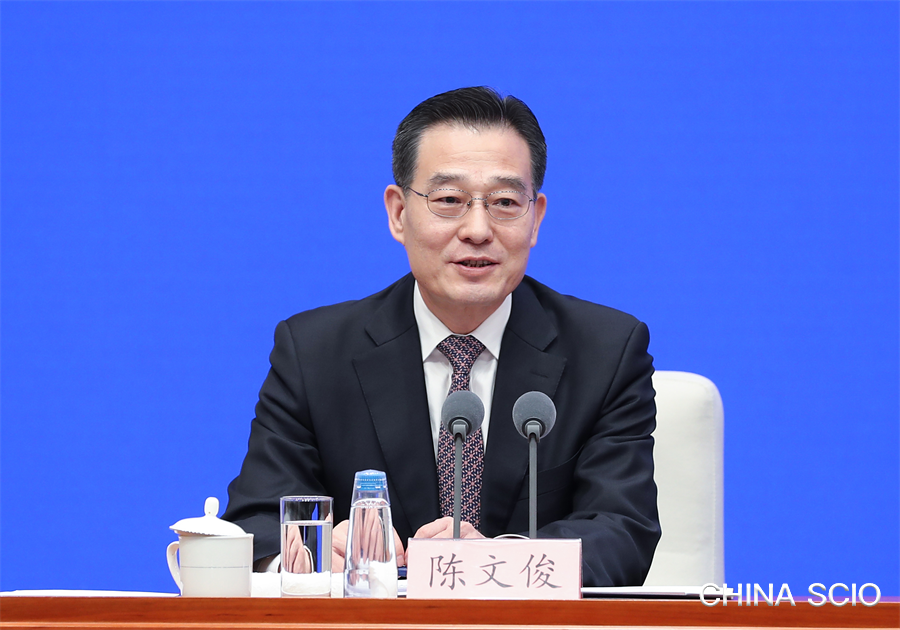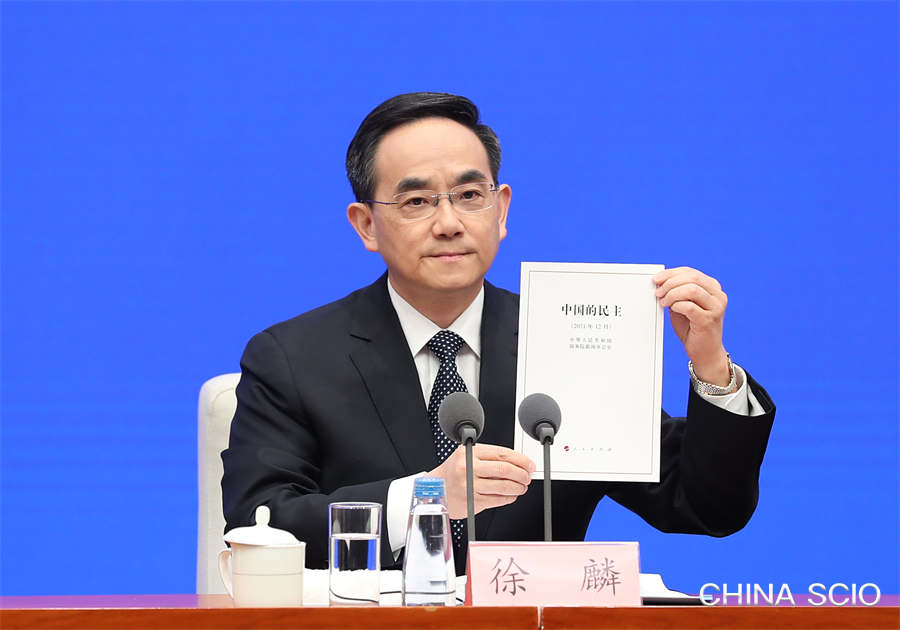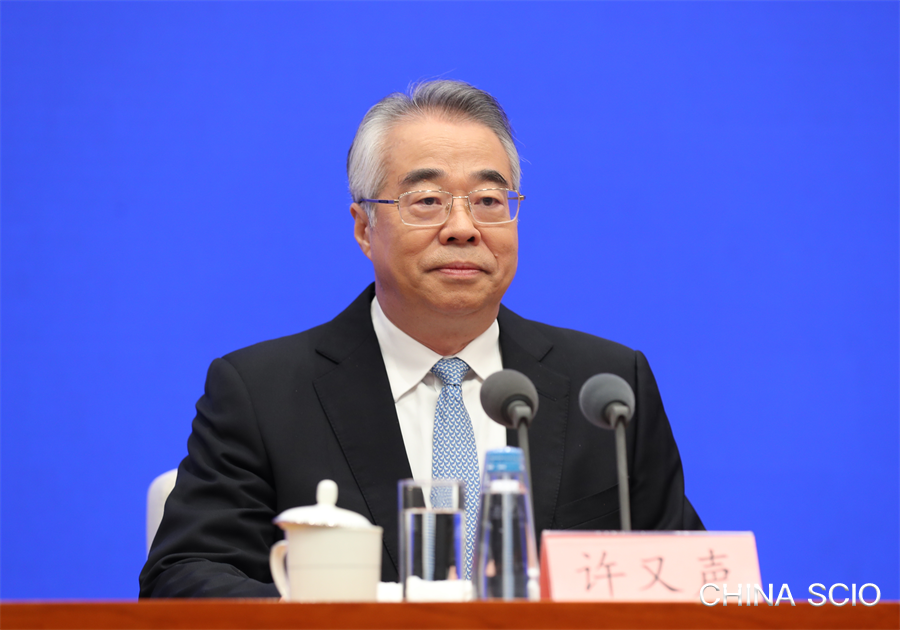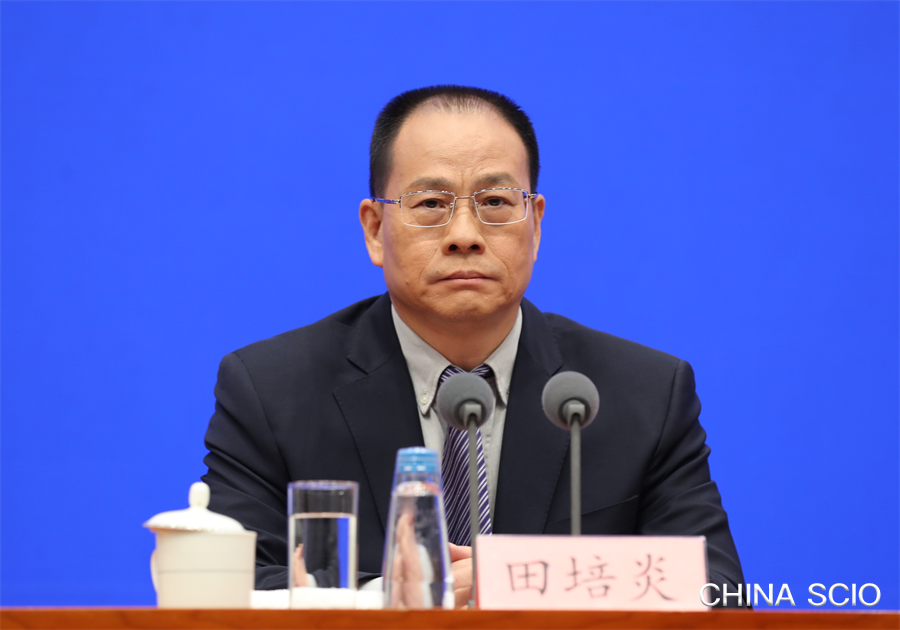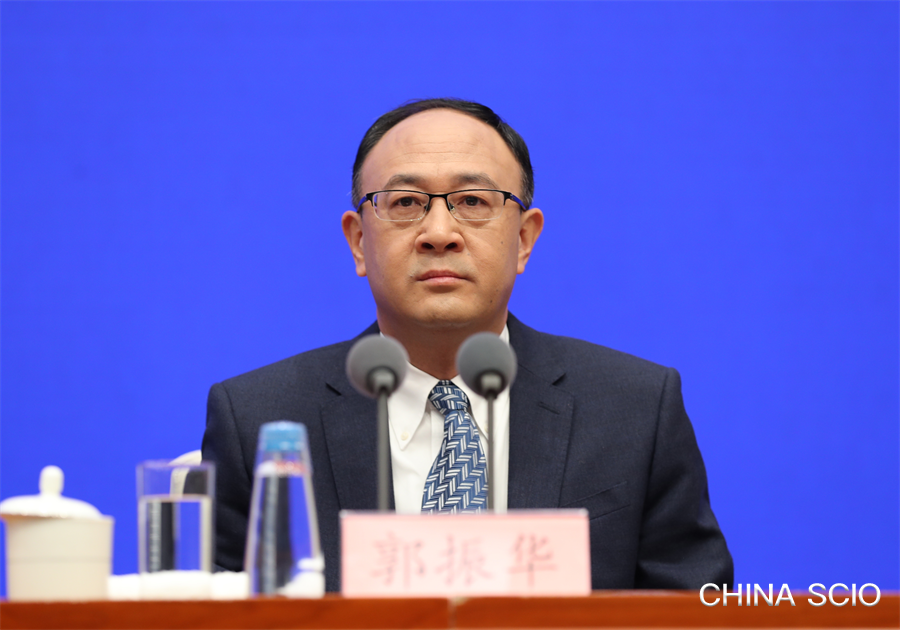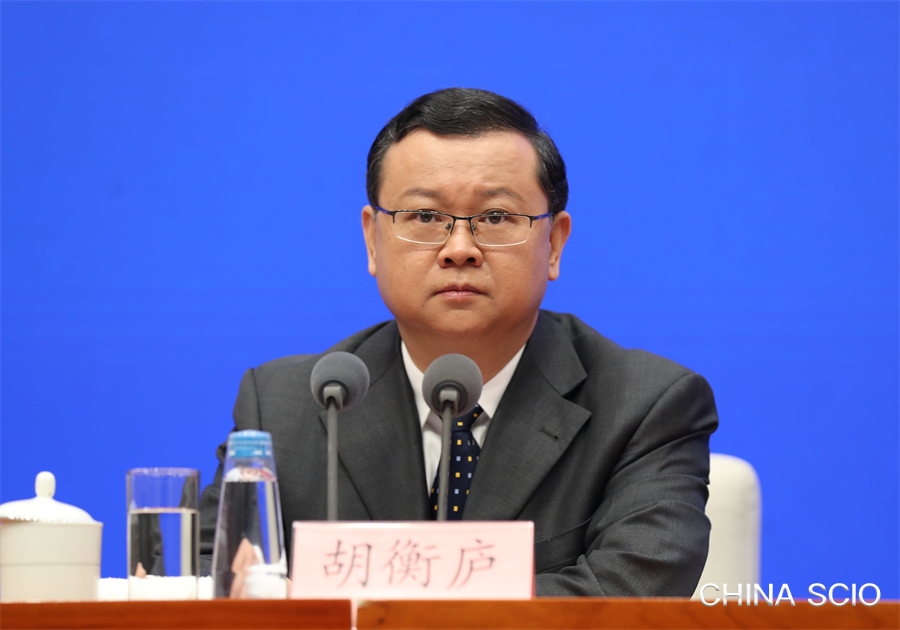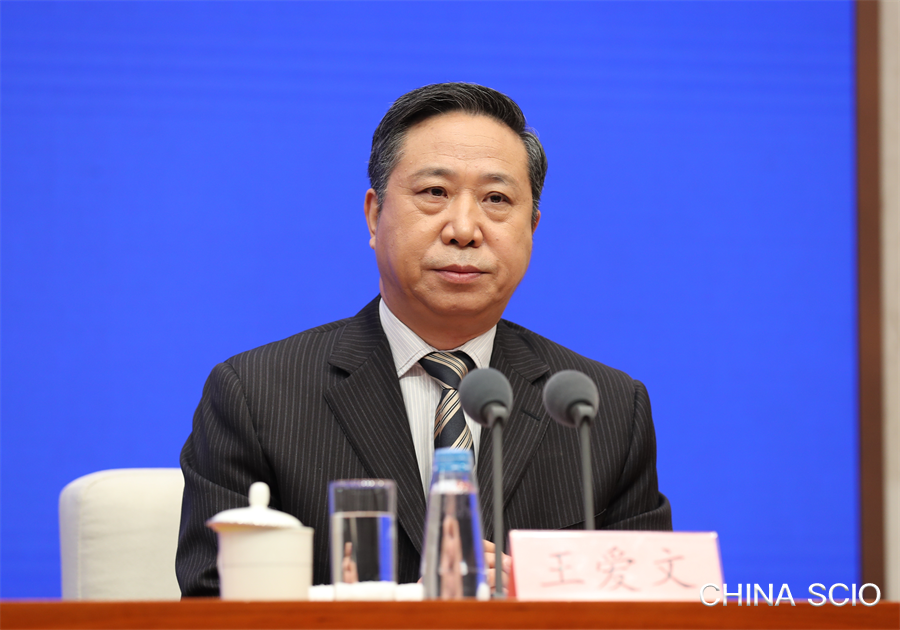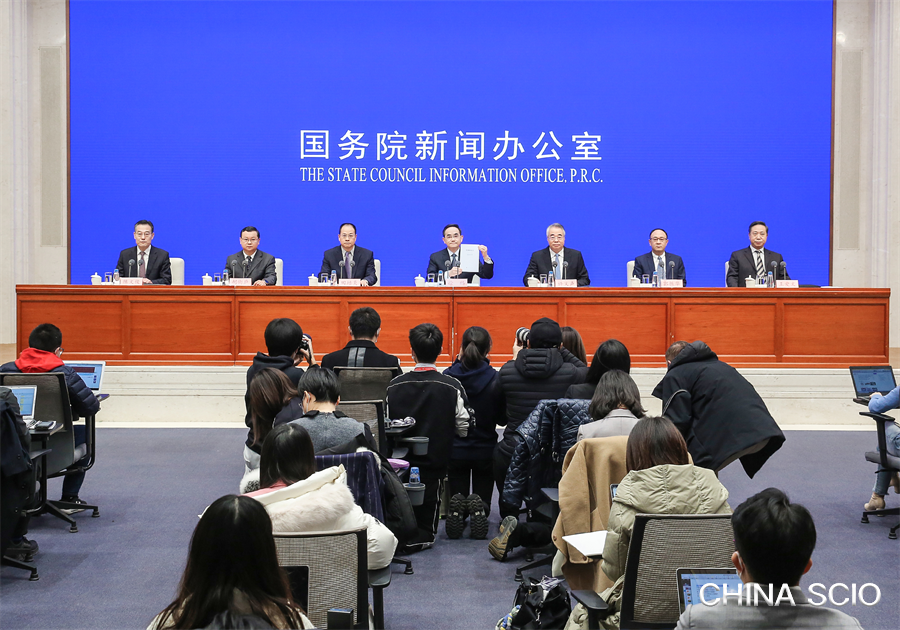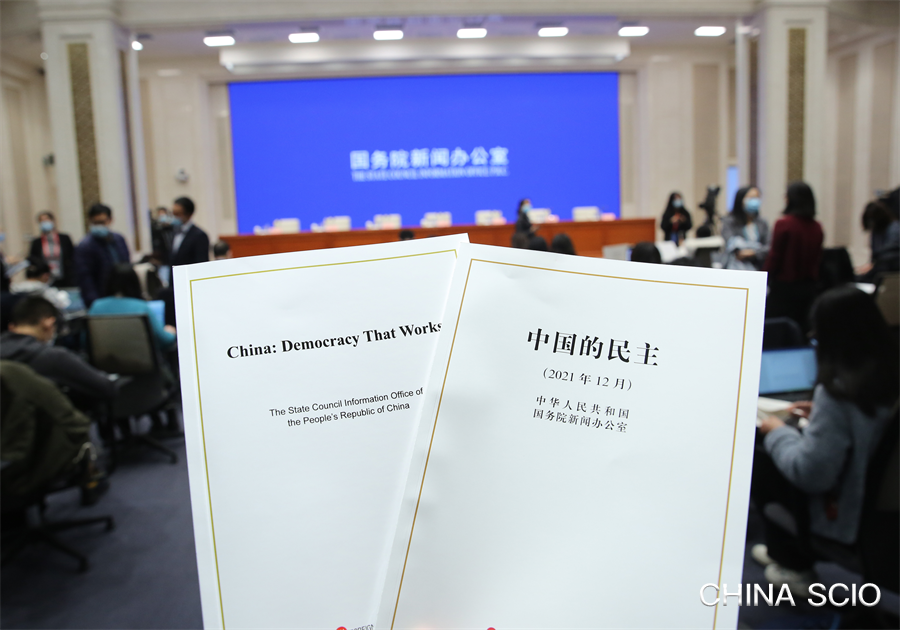.
Read in Chinese
Speakers:
Xu Lin, deputy director of the Publicity Department of the Central Committee of the Communist Party of China (CPC) and minister of the State Council Information Office (SCIO)
Xu Yousheng, deputy director of the United Front Work Department of the CPC Central Committee
Tian Peiyan, deputy director of the Policy Research Office of the CPC Central Committee
Guo Zhenhua, deputy secretary general of the Standing Committee of the National People's Congress (NPC)
Hu Henglu, head of the Research Department of the General Office of the National Committee of the Chinese People's Political Consultative Conference (CPPCC)
Wang Aiwen, vice minister of civil affairs
Chairperson:
Chen Wenjun, director general of the Press Bureau of the SCIO and spokesperson of the SCIO
Date:
Dec. 4, 2021
Chen Wenjun:
Ladies and gentlemen, good morning. The State Council Information Office (SCIO) is holding a press conference today to issue and introduce a white paper titled "China: Democracy That Works," and then take your questions. Present at today's press conference are Mr. Xu Lin, deputy director of the Publicity Department of the Central Committee of the Communist Party of China (CPC) and minister of the SCIO; Mr. Xu Yousheng, deputy director of the United Front Work Department of the CPC Central Committee; Mr. Tian Peiyan, deputy director of the Policy Research Office of the CPC Central Committee; Mr. Guo Zhenhua, deputy secretary general of the Standing Committee of the National People's Congress (NPC); Mr. Hu Henglu, head of the Research Department of the General Office of the National Committee of the Chinese People's Political Consultative Conference (CPPCC); and Mr. Wang Aiwen, vice minister of civil affairs.
Next, I will give the floor to Mr. Xu Lin.
_ueditor_page_break_tag_
Xu Lin:
Ladies and gentlemen, friends from the media, good morning.
Democracy is a common value of humanity and an ideal that has always been cherished by the CPC and the Chinese people.
This year marks the centenary of the CPC. Over the past hundred years, the Party has upheld people's democracy and led the people in realizing their status as masters of the country. The Chinese people now truly hold in their hands their own future and that of society and the country.
Since the Party's 18th National Congress, the CPC Central Committee with Comrade Xi Jinping at its core has developed whole-process people's democracy as a key concept and strived to implement it, further translating democratic values into science-based and effective institutions and concrete actions. The viability and strength of whole-process people's democracy can be seen across China.
Today, the SCIO issued a white paper titled "China: Democracy That Works." This important document is a systematic introduction to China's democratic values, their course of development, institutional arrangements and systems, actions, as well as relevant achievements and contributions. The document notes that whole-process people's democracy integrates process-oriented democracy with results-oriented democracy, procedural democracy with substantive democracy, direct democracy with indirect democracy, and people's democracy with the will of the state. It is a model of socialist democracy that covers all aspects of the democratic process and all sectors of society. It is true democracy that works.
The white paper consists of three parts: preamble, main body and conclusion. The main body is divided into five sections: "Whole-Process People's Democracy Under CPC Leadership," "A Sound Institutional Framework," "Concrete and Pragmatic Practices," "Democracy That Works" and "A New Model of Democracy." From these five aspects, it is clear that China's whole-process people's democracy has both distinctive ideals and pragmatic actions as well as both institutional procedures and participating practices. It not only promotes China's development, but also increases the diversity of the political progress of humanity. It is a democratic system that integrates the logics of history, theory and practice.
First, China's democracy puts the people as the country's masters. The people's status as masters of the country is the essence of people's democracy in China. The white paper reviewed the process in which the Party led the people in developing democracy during the New Democratic Revolution period (1919-1949), socialist revolution and reconstruction period (1949-1978), and the years of reforms, opening-up and socialist modernization after 1978. It notes that since the 18th CPC National Congress, the Party has led the people in proactively developing whole-process people's democracy, and China's democracy has entered a new historical stage with its people having greater confidence in the country's democratic course and the future of China's democracy getting brighter. The white paper points out that whole-process people's democracy is a creation of the CPC in leading the people to pursue, develop and realize democracy, embodying the Party's innovation in advancing China's democratic theories, systems and practices. The white paper stresses that the Party's history of struggle is a course of rallying the people and leading them to explore, establish and develop whole-process people's democracy.
Second, democracy in China has achieved a sound institutional framework. In China, the people's status as masters of the country is the bedrock of all the systems of the country, and underlies the operation of all the systems for state governance. Whole-process people's democracy involves complete institutional procedures.
China has adopted the governing system of the people's democratic dictatorship, upholding the unity of democracy and dictatorship to ensure the people's status as masters of the country. The system of people's congresses has been adopted as the governing structure, through which the people exercise state power effectively. China has upheld and improved the system of multiparty cooperation and political consultation under CPC leadership. The system is able to avoid situations where there is discussion without decision and there is decision without action. It also effectively mitigates the risks of inadequate oversight in one-party rule, and the problems of destructive competition in multiparty political systems. China has consolidated and developed the broad patriotic united front, systematically promoting harmonious relations between political parties, between ethnic groups, between religions, between social groups, and between Chinese people at home and overseas. China has upheld and improved the system of regional ethnic autonomy, making the people of all ethnic groups the masters of the country on the principle of ensuring the solidarity and unity of the country. China has also upheld and improved the system of community-level self-governance. Democracy at the primary level has been expanded so that local residents can manage their own affairs by serving the community, undertaking self-education, and exercising public scrutiny.
According to the white paper, these well-coordinated and comprehensive institutional procedures serve to put into place diverse, open, and well-organized democratic channels to ensure that the Party's policies and the state will are integrated with the people's aspirations and that the people are masters of the country.
Third, democracy in China has been tested through concrete and pragmatic practices. According to the white paper, if the people are awakened only to cast a vote but become dormant afterwards, that is no true democracy. If the people are offered great hopes during electoral campaigning but have no say afterwards, that is no true democracy. If the people are offered fulsome promises during electoral canvassing but are left empty-handed afterwards, that is no true democracy.
Whole-process people's democracy in China is a complete system with supporting mechanisms and procedures, and has been fully tested through wide participation. China's whole-process people's democracy is a combination of electoral democracy and consultative democracy, and is applied through a combination of elections, consultations, decision-making, management, and oversight. It covers the economic, political, cultural, social, eco-environmental, and other fields, with a focus on national development, social governance, and people's lives. Whole-process people's democracy ensures that the people's voices are heard and their wishes are represented in every aspect of China's political and social life. It prevents individuals from manipulating the political process to win elections, and leaves no room for politicians to shower promises while campaigning and break them all once elected.
Fourth, democracy in China is an extensive and true democracy that works. According to the white paper, democracy is not a decorative ornament, but an instrument for addressing the issues that concern the people.
With complete institutions and extensive participation, whole-process people's democracy has evolved from an idea into a system and mechanism of governance that has taken root in the soil of Chinese society and become part of people's lives. In China, all power belongs to the people, and the people enjoy extensive rights. In China, the people have gained a stronger sense of fulfillment, happiness, and security, and human rights are fully respected and protected. In China, democratic participation has kept expanding, and the people's demands can be freely expressed and effectively fulfilled.
The white paper points out that "One essential feature of a good model of democracy is that it will promote sound governance and boost national development," and "It is hard to see how a country can serve as a good example for the rest of the world if its own model of democracy is unsuccessful or inefficient in national governance." In addition, it states, "A good model of democracy should build consensus rather than creating social rifts and conflicts, safeguard social equity and justice rather than widening social disparities in favor of vested interests, maintain social order and stability rather than causing chaos and turmoil, and inspire positivity and appreciation of the good and the beautiful rather than instigating negativity and promoting the false and the evil."
China's democracy has boosted national development and social progress, and ensured the wellbeing of the people. It is high-quality democracy.
The white paper emphasizes that "Whether a model of democracy works should be tested in actual practice and judged by the people."
Fifth, China's democracy has contributed a new model to the international political spectrum. Representing nearly one-fifth of the world's population, the more-than-1.4 billion Chinese people enjoy the status as masters of the country and extensive rights and freedoms. China has explored a new path to democracy and contributed its experience to global political progress.
The white paper points out that, "China has created and developed whole-process people's democracy in line with its national conditions. This is a form of democracy with distinctive Chinese features which at the same time reflects humanity's universal desire for democracy." It also says "There is no single road to democracy."
"Political systems vary from civilization to civilization, and each has its own strengths." "To judge other countries by one's own yardstick, or force them to duplicate one's own political system or democratic model … are undemocratic in themselves." Therefore, such deeds earn no one's heart and are doomed to fail.
The white paper highlights that "All countries should uphold the principle of nondiscrimination, respect others' models of democracy, share experience with others, explore their own paths, and contribute their due share to human progress."
"There is always scope for improving the system of democracy." "China has achieved considerable progress in developing democracy; … China still needs to make further improvements. On the path towards comprehensive socialist modernization, the CPC will continue to uphold people's democracy, embrace the people-centered development philosophy, promote whole-process people's democracy, ensure the sound development of democracy, and pursue well-rounded human development and common prosperity for everyone."
"The Chinese people are willing to work together with all other peoples around the world to carry forward the common values of humanity – peace, development, fairness, justice, democracy and freedom. In a spirit of mutual respect and following the principle of seeking common ground while setting aside differences, we will add new elements to the world's political structure and advance towards a global community of shared future together."
That's all I have to introduce. Thank you!
_ueditor_page_break_tag_
Chen Wenjun:
Thank you, Mr. Xu. The Q&A session starts now. Please identify the news outlet you work for before raising a question. We have many journalists from other countries here, and questions asked in English will be interpreted into Chinese on the spot. Please start your questions now.
People's Daily:
China upholds the CPC's overall leadership, especially the centralized and unified leadership of the CPC Central Committee. What is the relationship between upholding the leadership of the CPC and whole-process people's democracy? Thank you.
Tian Peiyan:
The essence of the leadership of the CPC is to uphold and ensure the people's status as masters of the country. "Whole-process people's democracy is a creation of the CPC in leading the people to pursue, develop and realize democracy, embodying the Party's innovation in advancing China's democratic theories, systems and practices." Developing whole-process people's democracy can ensure the CPC leadership more effectively. We can say that upholding the CPC leadership is highly consistent with developing whole-process people's democracy, with the two reinforcing and complementing each other.
On the one hand, upholding the CPC leadership is the fundamental guarantee for whole-process people's democracy. The CPC represents the fundamental interests of the overwhelming majority of the Chinese people, without any special interests of its own, and never represents the interests of any interest groups, powerful groups, or privileged elites. It stands firmly with the people and relies closely on the people to create history. In such a vast country with a population of more than 1.4 billion from 56 ethnic groups, if we were without the CPC leadership, especially the centralized and unified leadership of the CPC Central Committee, or if we implemented the so-called "democracy" in the West, it would be easy to become destabilized and fall into chaos, and democracy would inevitably reverse. Only by upholding the CPC leadership can we guarantee the right direction of democracy and ensure that people administer state affairs and manage economic and cultural undertakings and social affairs through various channels and in various ways in accordance with the law.
On the other hand, developing whole-process people's democracy is the intrinsic requirement of upholding the CPC leadership. Developing whole-process people's democracy can pool people's wisdoms and strengths into the cause of the CPC and the state, build stronger public support for the CPC leadership, make the policymaking of the CPC more reasonable, and implement the theories, lines, principles, and policies of the CPC in a more thorough and vigorous way. Thank you.
_ueditor_page_break_tag_
Lianhe Zaobao:
I have two questions. The U.S. will convene a Summit for Democracy next week. Recently, China has also emphasized whole-process people's democracy, and it released a white paper titled "China: Democracy That Works" today. Some hold that China and the U.S. are now in a struggle to make their own voice heard about democracy. What's your opinion on this? My second question is, the CPC will convene its 20th national congress in the second half of next year, and a total of 2,300 delegates to the congress will be elected. Could you please brief on the composition of the delegates, such as the ratio of officials against grassroots representation or that of male versus female? Thank you.
Xu Lin:
Thank you for your questions. First, we always hold that democracy comes in many forms. There are many ways to achieve it, and the model that suits best is always the most appropriate. As I have just mentioned, China's whole-process people's democracy is a model of socialist democracy that covers all aspects of the democratic process and all sectors of society. It is true democracy that works. It is rooted in China's history and culture, and suited to the country's national conditions. With distinctive Chinese characteristics, it draws on the achievements of human civilization, exemplifies common values of humanity, enriches international politics, and contributes China's ideas and solutions to the development of democracy.
We always uphold that we should be open and inclusive and seek common ground while setting aside differences for different forms of democracy in different countries. As for the explorations and efforts in pursuit of democracy in different countries, we should respect them and draw on each other's experiences. That is true democracy. A handful of countries, adopting the hegemonic mindset that "whoever disagrees with me is wrong," treat other forms of democracy as undemocratic and even reject or suppress them. Those deeds are undemocratic themselves. Their models of democracy are notorious, and their own domestic governance is a mess, but they dictate to others and hurl abuses at others' models of democracy. Does this conform to their so-called democracy?
The U.S. proclaims itself "leader of democracy" and organizes and maneuvers a so-called "Summit for Democracy." But in fact, it just wants to suppress and contain countries with different social systems and development modes in the disguise of democracy. The deeds of being against democracy with the name of fake democracy are doomed to be a joke in the development of democracy and would not get any support.
As for your second question, next year, the CPC will convene its 20th national congress. Recently, the CPC Central Committee released a circular on the election of delegates to the Party's 20th national congress. Officials of the Organization Department of the CPC Central Committee were interviewed by Xinhua News Agency on the related issues. Here, I would like to give you a more detailed introduction.
According to the CPC Central Committee, a total of 2,300 delegates will be elected to the Party's 20th national congress. The quota for the number of delegates is mainly determined by the number of Party organizations and the number of Party members, while taking into account such factors as the number of delegates to the previous national congresses.
The CPC Central Committee stresses guaranteeing the proportion of delegates from frontline work and production. Among delegates representing provincial level regions, the central financial sector, and Beijing-based centrally-administered enterprises, Party members from the front line should account for at least one-third of the total while those at various leadership posts should not exceed two-thirds of the total. Female Party members should account for a certain proportion of the delegates. The proportion of female delegates from a provincial level region should be higher than that of female Party members in the total number of Party members in the region. There should be a certain number of female delegates from the central and state organs, the central financial sector, Beijing-based centrally-administered enterprises, the People's Liberation Army, and the People's Armed Police Force. These fully embody democracy within the Party and extensive representation, which will enable delegates to the Party's 20th national congress to better represent and reflect the will of Party members from all walks of life and sectors. Thank you.
_ueditor_page_break_tag_
Kyodo News Agency:
What kind of people can be candidates for people's congress deputies? How to elect deputies to the NPC and the local people's congresses at all levels? Compared with the systems of Western countries, what are the differences and characteristics? Thank you.
Guo Zhenhua:
The system of people's congresses is China's fundamental political system, whose original aspiration and essence is to ensure Chinese people's status as masters of the country. The Constitution stipulates that all power in China belongs to the people. The election of deputies to people's congresses, which is the basis of the system of people's congresses, has two notable characteristics:
First, the rights to vote for Chinese citizens are the most extensive. According to the Constitution, all citizens of the PRC who have reached the age of 18 shall have the right to vote and stand for election; persons deprived of political rights in accordance with law shall be an exception. Currently, more than 1 billion voters are participating in the elections to people's congresses at the township and county levels. Elections at the grassroots level are the most dynamic form of China's whole-process people's democracy, and also the world's largest elections.
The latest news reported that, in Beijing, Chinese President Xi Jinping, as a voter in Zhongnanhai electoral district in Xicheng district, cast his ballot at the Huairentang polling station. In Sichuan province, a 106-year-old woman cast her vote at a mobile ballot box outside her house. In Shanghai, a senior couple – a 90-year-old husband and his 78-year-old wife – displayed their collection of 31 voter's certificates after voting. These certificates are all owned by the couple, spanning 68 years. The oldest certificate belongs to Mr. Yuan, who participated in the first nationwide election of deputies to people's congresses in 1953 after the founding of the PRC.
Second, the deputies to people's congresses are fully representative of the people. China has five-level deputies: national, provincial, city, county, and township. At the end of 2020, 2.623 million people were serving as deputies to people's congresses at all levels nationwide. Among them, 2.478 million are at the township and county levels, accounting for 94.5% of the total. Deputies at the township and county levels are directly elected by the public; one person has one vote. Deputies to people's congresses at the city, provincial, and national levels are elected by people's congresses at the next level below. China's Electoral Law stipulates that there shall be an appropriate number of deputies from all regions, ethnic groups, and sectors, and makes clear requirements for the proportion of deputies elected from the grassroots level, especially workers, farmers, professionals and technicians, women, and ethnic minorities. It can be said that in China, deputies to people's congresses come from every region, every industry, every field, and every ethnic group.
Take the 13th NPC as an example. Among the nearly 3,000 deputies to the 13th NPC, 742 are women deputies, accounting for 24.9% of the total; and 468 workers and farmers, accounting for 15.7% of the total, including 45 migrant workers. Moreover, 613 deputies are professionals, accounting for 20.6% of the total, and 438 deputies are from ethnic minority groups, accounting for 14.7% of the total. All 55 ethnic minorities in China have NPC deputy representation. Even those with a very small population would have at least one NPC deputy. For example, the Monba ethnic group in Tibet, which has a population of around 10,000, also has one NPC deputy, who is female. She is a teacher at a local elementary school.
In terms of the characteristics that define China's electoral system, I would like to add a few points. China's first Electoral Law in 1953 granted the universality of the right to vote. It took Western countries several hundred years to realize universal suffrage in the legal sense while China achieved true universal suffrage without all those twists and turns. On the increasing number of people participating in elections – which is also the voter turnout – since the initiation of reform and opening up, China has conducted 12 direct elections to people's congresses at the township level and 11 direct elections at the county level, with a current participation rate of around 90%. On election funding in China, finances for deputy elections come from the treasury, which provides an institutional guarantee that election integrity will not be compromised by financial interests.
Thanks.
_ueditor_page_break_tag_
Phoenix TV:
The system of regional ethnic autonomy is an important part of socialist democracy with Chinese characteristics. Some voices from the international community believe that the Chinese government has tightened its management of ethnic minority groups, and that ethnic minorities don't have authentic autonomy. What's your comment on that? Thank you.
Xu Yousheng:
Thank you for your question. We know that the system of regional ethnic autonomy is a basic political system in China. It provides an important institutional guarantee for following the correct path of resolving ethnic problems according to Chinese principles. The system of regional ethnic autonomy means that areas with large ethnic minority populations can practice regional autonomy, establish autonomous organs and exercise the power of self-government under the unified leadership of the state. There are currently 155 ethnic autonomous areas in China, including five autonomous regions, 30 autonomous prefectures and 120 autonomous counties (banners). The area where regional ethnic autonomy is practiced accounts for 64% of the entire territory of China.
The system of regional ethnic autonomy is fundamentally aimed at maintaining national unity and ethnic solidarity. All autonomous organs of these areas are local governments subject to the unified leadership of the central government. They must ensure that national policies and orders are implemented smoothly and that national laws and regulations are enforced. On that basis, they must guarantee the equal rights and obligations of various ethnic groups in accordance with the law, support their economic development and improve their citizens' quality of life, achieve common development and common prosperity, and ensure that the autonomy of ethnic groups is fully realized. The ethnic autonomous areas enjoy autonomous rights across a wide range of fields, including legislative power, the right of economic development, the right of financial management, the right to cultivate and appoint ethnic minority officials, the right to develop education and culture and the right to use their own spoken and written languages, among others. Take the training and appointment of ethnic minority officials, something the CPC and Chinese government prioritizes, as an example. After more than 70 years, we have built a sizable and qualified team of ethnic minority officials, which has laid an important organizational foundation for implementing the system of regional ethnic autonomy. On all standing committees of people's congresses of the 155 ethnic autonomous areas, there are citizens from the local ethnic groups assuming the office of chair or vice chair. Likewise, all governors, prefectural commissioners and heads of counties of ethnic autonomous areas are citizens from local ethnic groups.
Practice has proved that China's implementation of the system of regional ethnic autonomy is not only conducive to national unity, ethnic solidarity, and social stability, but also conducive to the development and progress of ethnic minorities and the long-term stability of the country. In the nine years from 2012 to 2020, the regional GDP of the five autonomous regions of Inner Mongolia, Guangxi, Tibet, Ningxia, and Xinjiang and the three multi-ethnic provinces of Yunnan, Guizhou, and Qinghai increased from 5.1 trillion yuan to 10.4 trillion yuan; the per capita regional GDP increased from 27,000 yuan to 52,000 yuan; and the urbanization rate increased from 43.1% to 55.1%. All 31.21 million impoverished people in ethnic minority areas have been lifted out of poverty, 420 state-level impoverished counties in ethnic autonomous areas have all gotten rid of poverty, and together with the rest of the country, they have achieved moderately prosperity in all respects.
As to whether the system of regional ethnic autonomy is good or not, whether it works or not, it should be judged by the Chinese people. The development and progress of ethnic minority areas, and the tangible data of people of all ethnic groups living a good life, are the best and most resounding answers. Thank you.
_ueditor_page_break_tag_
Guangming Daily:
We know that the system of the CPPCC was born in 1949. After more than 70 years of development and practice, what are the advantages and characteristics of this political institution in China's model of democracy? Thank you.
Hu Henglu:
Thank you for your question. The CPPCC originates from the political system created by the leading CPC and all non-communist parties, public figures without party affiliation, people's organizations, and public figures of all China's ethnic groups and sectors of society. It is deeply rooted in China's history and culture, and is an important means to achieve people's democracy in China. In September 1949, the first plenary session of the CPPCC was held, marking the formal establishment of the system of the CPPCC. For more than 70 years, under the leadership of the CPC, the CPPCC has adhered to the two themes of solidarity and democracy, served the central tasks of the CPC and the country, and played an important role in the great practice of establishing and developing the PRC, exploring paths of reforms, and realizing the Chinese Dream.
Socialism with Chinese characteristics has entered a new era. The CPPCC is an important channel and a specialized body for socialist consultative democracy. It integrates consultation, supervision, participation, and cooperation. It promotes broad unity, promotes multi-party cooperation, and practices people's democracy in consultations. It is an important part of China's national governance system and a political institution with Chinese characteristics. It has many characteristics and advantages in China's model of democracy and the whole-process people's democracy:
First, it promotes scientific and democratic decision-making in the process of political consultation. We insist on consultation before and during decision-making. Through plenary sessions, meetings of the standing committee, meetings of chairpersons, meetings of special committees, forums on specific subjects, and consultative seminars, we conduct extensive and in-depth consultations on the major policies of the country, important issues in various economic and social fields, and concerns of the people. For example, around the formulation and implementation of the 14th Five-Year Plan, we actively provided suggestions and political consultations on CPPCC's platform of consultation, submitted information for more than 220 rounds, put forward more than 190 proposals, and promoted the wishes, appeals, suggestions, and opinions of the CPPCC members and all walks of life in society to be fully reflected in the decision-making.
Second, it expands consensus and enhances solidarity in the process of political consultation. Through the CPPCC platform, all parties and groups, as well as people from all ethnic groups and all walks of life that participate in the CPPCC, not only conduct in-depth consultations and discussions on state affairs, pragmatically put forward opinions and suggestions, but also accept the propositions of the CPC, and then help publicize and explain the Party's policies and guidelines among people of different circles, enhancing trust and dispelling doubts, realizing the two-way effort of contributing their suggestions to aid administration, and, building consensus. For example, the 13th National Committee of the CPPCC implemented the decisions and arrangements of the CPC Central Committee, and actively consulted and made suggestions on how to resolutely win the fight against poverty, meanwhile, it tells the story of China's poverty reduction from the perspective of the CPPCC through member lectures, inspections, and themed reading groups. The CPPCC members therefore have a deep understanding of the original aspiration and mission of the CPC, the great course of building a moderately prosperous society in all respects, and the institutional strengths of the socialism with Chinese characteristics.
Third, it guarantees the people's orderly political participation in the process of political consultation. The CPPCC is composed of representatives from 34 sectors, including the CPC, the other political parties, the non-affiliates, people's organizations, 56 ethnic groups, and five major religions. At present, there are more than 3,200 CPPCC organizations at the national, provincial, city, and county levels, with more than 600,000 CPPCC members at all levels. This effectively guarantees all parties, organizations, ethnic groups, social groups and people from all walks of life to participate in the state affairs. The CPPCC supports non-Communist parties and non-affiliates to participate in the consultation and discussion of major national policies on the CPPCC platform, and makes institutional arrangements for the non-Communist parties to express their opinions and make suggestions on the CPPCC platform in the name of their own party. It serves as an important political and organizational form for implementing the system of multiparty cooperation and political consultation under the leadership of the CPC.
Thank you.
_ueditor_page_break_tag_
Reuters:
Comparing the whole-process people's democracy in China with democracy in the U.S., one difference is that voters in the U.S. can hold elected politicians accountable and vote them out in the next election if they think they didn't do a good job. Meanwhile, people's congresses in China only need to satisfy their superiors and the Party after being elected, and voters cannot vote out their superiors even if they are dissatisfied. What are your comments on this? Thank you.
Tian Peiyan:
Democracy is a concrete phenomenon that is constantly evolving. Rooted in history, culture, and tradition, it can take different forms and develops along the paths chosen by different peoples based on their exploration and innovation. The forms of democracy in China and in the U.S. should be tested in real-world scenarios and judged by the peoples.
Under the American system of democracy, politicians are agents of interest groups, rather than representatives of the interests of the voter majority or the country as a whole. They can willfully make promises to get elected but seldom fulfill them after being elected. They appear to be overseen by voters, but once elected, there's nothing voters can do but wait for the next election. If the people only wake up to cast a vote but become dormant afterwards, that is not true democracy. If the people are offered great hopes during electoral campaigns but have no say afterwards, that is not true democracy. If the people are offered fulsome promises during electoral campaigns but are left empty-handed afterwards, that is not true democracy. The Chinese people dislike and have no need for this kind of democracy.
Democracy in China is whole-process people's democracy under the leadership of the CPC. Party members and officials at all levels must accept oversight from the Party and the people throughout all aspects and sectors of the whole process, so as to ensure that public power, entrusted by the people, is and will always be exercised for the public good. No matter how high-level his or her position is, the person found to have violated Party discipline or state laws will be seriously punished, without exception. Deputies come from the people, represent the people, serve the people, are elected by the people, and are accountable to the people. They maintain close ties with the people at all times, always listen to and respond to the people's aspirations, actively advance solutions for the most pressing difficulties and problems that are of great concern to the people, and accept the oversight of the people and all social sectors. They are deputies who represent the people, reflect the will of the people, pool the wisdom of the people, and benefit the lives of the people. Voters and electoral units can disqualify or dismiss deputies who either cannot fulfill their duties or violate Party discipline or state laws, without having to wait until the next election. This kind of democracy is more broad-based, authentic, and effective.
According to surveys conducted by Harvard Kennedy School in China for 13 consecutive years, the Chinese people satisfaction with the Chinese government under the leadership of the CPC runs as high as 93%. I think people will make fair judges when comparing the democratic system in China with that in the U.S. Thank you.
Guo Zhenhua:
I agree very much with what Mr. Tian said about the contrast between how politicians in the U.S. behave during and after their election campaigns. I think one of the most important reasons is that, in the U.S., there is no institutional design or arrangement in its legal system for politicians, including members of Congress, to be overseen by voters after being elected. Even if voters are dissatisfied, they have to wait until the next election years later. In addition to the "revolving door" unique in the U.S. politics, it is unsurprising that members of the U.S. Congress speak for interest groups and are swayed by lobbying groups. On the contrary, in China, both the Constitution and the Electoral Law of the National People's Congress and Local People's Congresses stipulate that deputies to the NPC and people's congresses at local levels are subject to the oversight of voters and electoral units that elected the deputies, and voters and the electoral units have the right to dismiss deputies they elected. The Electoral Law also clearly stipulates procedures of dismissing deputies, giving voters in deputies' home electoral districts or deputies to the people's congresses of electoral units the power to jointly propose dismissals. In the past nearly four years since the 13th NPC, 10 NPC deputies have been dismissed in accordance with the law.
In all, comparing China with the U.S., the case is exactly the opposite of how you described. China's deputies to people's congresses are subject to strict and effective oversight during their terms of office, and the law stipulates clear dismissal rights and procedures. In the U.S., however, there is no institutional arrangement for those including members of Congress to be dismissed or supervised by voters during their terms of office. That is why we say that China's whole-process people's democracy has a sound institutional framework and concrete practices, which can ensure that voters and electoral units can effectively oversee the deputies they elect and leave no room for politicians to shower promises while campaigning and break them once elected.
Thank you.
_ueditor_page_break_tag_
China News Service:
What is the system of community-level self-governance in China? How do villagers committees and residents committees exercise self-governance? Thank you.
Wang Aiwen:
Thank you for your concern about the system of community-level self-governance, which is a basic political system in China. It is specified in the country's Constitution that residents committees established in urban areas and villagers committees in rural areas according to people's residences are people's organizations for self-governance at the grassroots level. Under the leadership of community-level Party organizations, such self-governance is a way for urban and rural residents to exercise their democratic right in accordance with the law to manage their own affairs including community governance, public affairs and public services by serving the community, undertaking self-education and exercising public scrutiny.
China has 492,000 villagers committees and 116,000 residents committees, covering all residents in urban and rural areas. These committees are selected by residents. How do they exercise self-governance?
First, they organize democratic consultation. They pool ideas and widely solicit public opinions from residents. For example, they solicit residents' opinions regarding such affairs as the handling of community sanitation, aiding people in difficulty and expending collective income of villages, and make a to-do or priority list for the committees.
Second, they practice democratic decision-making on the basis of consultation. They review the affairs of consultation including the committee work to form final decisions through committee meetings and congresses.
Third, they organize residents to formulate or amend their own rules on self-governance and codes of conduct and self-regulation, which all residents need to obey.
Fourth, they organize residents to oversee their work and review the performance of their staff. The entire decision-making process is made public, and so are the results of the decisions, which, together with residents' discussions, can be accessed via bulletins put on walls and bulletin boards or via cellphone. This practice ensures the supervision of the work of the committees.
The system of community-level self-governance not only ensures people's democratic rights, but also plays an important role in our responses to major risks and challenges. In the fight against the epidemic, communities face great pressure in epidemic control due to China's large population of density. However, we have effectively contained the epidemic in our communities, because our residents and villagers committees have effectively organized the people to carry out joint and society-wide prevention and control, and contained the epidemic in communities. In the face of major risks and tests, the advantages of the Chinese system have been demonstrated. Thank you.
_ueditor_page_break_tag_
CRNTT:
Democracy means supervision of public power. Judging from the corruption cases China has addressed in recent years, the country's anti-corruption situation is still complex and grave. What is your opinion on this matter? Thank you.
Tian Peiyan:
I'd like to take this question. Corruption is a common historical and social phenomenon in human society, which exists in all countries around the world. It is incompatible with the nature and principles of the CPC. Since its founding, our Party has been resolutely fighting against corruption. For a period before the Party's 18th National Congress, corruption was rather prominent in the country. Following the congress, our Party was deeply aware that corruption is the greatest threat to the Party's long-term governance. The fight against corruption is a matter of survival for the Party and the country, and therefore it is a major political battle that we cannot afford to lose, and also must not lose. Our Party is determined to honor its commitment to the 1.4 billion Chinese people by fighting corruption. No refuge has been excluded from the scope, no ground left unturned, and no tolerance shown in the fight against corruption. China has continued to impose tight constraints and maintain a tough stance and long-term deterrence, and has won a sweeping victory in the fight against corruption. Meanwhile, we are soberly aware that corruption has not been eradicated, and some areas are prone to corruption. The fight against corruption remains grave and complex, and will not stop. Our Party will continue to take integral and coordinated actions to raise the awareness, ability and resolve to resist corruption, and adopt effective measures to consolidate China's sweeping victory in the fight against corruption.
It is an important function of democracy to practice democratic oversight of public power and prevent its abuse and corruption. Since the 18th CPC National Congress, the Party has emphasized that public power is, and will always be, exercised for the public good and that power is prescribed by law, and regulated, constrained, and supervised by legal means to restrain power in an institutional cage. The exercise of power has been brought under stricter supervision. The supervisory systems of the Party and the state have been improved, and the reform of supervision mechanism and system building in key sectors have been advanced. A supervision system has been established with intra-Party supervision playing the leading role and various kinds of supervision coordinating with each other, thus preventing the anomie of power and rent-seeking to the largest extent. The Party has upheld democratic oversight throughout the entire process of the exercise of power and given full play to the irreplaceable role of democratic oversight in preventing corruption, thus reducing existing corruption constantly and restraining the increase of corruption effectively. Many corrupt officials were exposed through tip-offs and complaint letters, and individual interviews during disciplinary inspections. The fact that a large number of corrupt officials were investigated and handled does not mean the malfunction of democracy but proves the effectiveness of democratic oversight. We firmly believe that with the development of China's democracy and political system, democratic oversight will be more powerful, and corrupt officials shall have nowhere to hide in China. Thank you.
_ueditor_page_break_tag_
Red Star News:
We all know that the deputies to community-level people's congresses are selected through direct election while those in the higher levels of people's congresses are elected indirectly. Will the current system mean that the suggestions and voices from ordinary people, especially vulnerable groups, will not be reflected in the highest level and be considered in the country's decision-making? Thank you.
Guo Zhenhua:
The system of people's congresses is an important institutional support to whole-process people's democracy. The deputies to people's congresses in China, no matter at the national or community level, all come from the people and are rooted in the people. In addition, the deputies to people's congresses will stay in their original work positions after being elected so that they are in close contact with the people.
In recent years, the people's congresses at all levels have set up more than 220,000 stations for the deputies to be in contact with the people, covering all townships and subdistricts across the country, and even some communities and villages. Deputies to the people's congresses at all levels receive information from the people and listen to their opinions at the stations on a regular basis. Such a system determines that deputies to the people's congresses in China are not career politicians and do not represent any particular interests. Therefore, they can truly and directly understand the people's aspirations and wishes, and submit the people's suggestions and advice through agencies of state power. At the NPC session each year, nearly 3,000 deputies will submit thousands of documents providing suggestions and advice. In this year's fourth session of the 13th NPC, the deputies put forward 8,993 suggestions, among which, the people's well-being was the biggest topic of discussion. For example, they discussed easing the burden of excessive homework and off-campus tutoring for students undergoing compulsory education, improving rural elderly care service systems, advancing a "toilet revolution" in rural areas, promoting the sorting of urban household waste, and improving social security for flexible employees such as delivery personnel. The suggestions bear the people's pursuit for a better life, reflect their aspirations, and demonstrate the responsibilities that the deputies have shouldered to hear the people's voices, pool the people's wisdoms, and benefit the people's lives. State organs carefully review the suggestions proposed by the deputies in accordance with law, and research and adopt reasonable suggestions in their work, including in their decision-making. They respond actively to social concerns and each and every one of the people's aspirations.
Thank you.
_ueditor_page_break_tag_
Global Times:
Some countries claim to be models of democracy for the whole world, but their response to the pandemic was awful and their social governance disordered, which is contradictory to that message. What are the functions of democracy? What are the standards for evaluating democracy? Thank you.
Tian Peiyan:
Democracy is not a decorative ornament, but an instrument for addressing issues that concern the people. True democracy should both take full cognizance of and fully realize the people's aspirations; give full expression to diversified opinions and advice, and form the united will of all the people; spur social creativity and vitality to the largest extent, and uphold social equity and justice effectively.
For a long time, America has claimed itself as a model of democracy for the whole world. However, in the face of a pandemic unseen in a century, the American democratic system has exposed numerous of its maladies. In responding to the pandemic, due to serious political polarization, endless disputes among political parties, lack of coordination in different levels of government, and malfunctions in social oversight, America has failed to prevent and control the pandemic, which resulted in infections of nearly 50 million people and a death toll of more than 800,000. Such democracy will only bring disasters rather than happiness to the electorate .
In the face of COVID-19, the CPC and the state have prioritized the people by putting their lives and health first, confidently risen up to the challenges and made resolute decisions, waging an all-out people's war against the virus in the shortest possible time. We have leveraged our institutional strengths to mobilize the whole nation and carried out a campaign to save lives on an unprecedented scale, which have reflected the country's nationwide coordination and solidarity. We have done everything possible to treat all patients, ranging from new-born infants to centenarians, saving countless lives. This has fully demonstrated that China's democratic system respects and protects everyone's life.
How do you evaluate whether or not a country's political system is democratic and efficient? General Secretary Xi Jinping has given a definitive answer: It mainly depends on whether the succession of its leaders is orderly and in line with the law; whether all the people can manage state and social affairs and economic and cultural undertakings in conformity with legal provisions; whether the public can express their requirements without hindrance; whether all sectors can efficiently participate in the country's political affairs; whether national decision-making can be conducted in a rational and democratic way; whether people of high caliber in all fields can be part of the national leadership and administrative systems through fair competition; whether the governing party is in charge of state affairs in accordance with the Constitution and the law; and whether the exercise of power can be kept under effective restraint and supervision. History has proven that the China's style democracy works well in China. History will prove that the CPC will lead the Chinese people to enrich and improve the Chinese way of democracy, so that the tree of democracy will flourish with vitality. Thank you.
_ueditor_page_break_tag_
CGTN:
Some people think that China is exporting its model by virtue of its growing strength, which poses threats and challenges to the "world's democracies." What's your take on this?
Xu Lin:
Thank you for your question. First of all, I would like to point out that the concept of "world's democracies" is a false proposition concocted by a few countries. Democracy is the common value of humanity and a shared wealth of global political progress. Democracy is the right of the people in every country, rather than the prerogative of a few nations. It is for its people to judge whether a country is democratic or not, and it is up to the international community to judge whether a country is democratic or not. As Mr. Tian Peiyan just said, certain countries pose as the "model of world democracy" and "beacon of democracy" while failing to combat the pandemic, suffering chaotic domestic governance and severe political polarization, and imposing hegemony and bullying other countries. Doesn't it sound absurd? At present, the cause of human democracy stands at a crossroad between progression and regression. Some countries are inciting confrontation and division globally in the name of democracy and aggravating international tensions, and became a source of chaos in the world. It is clear to all who is threatening the cause of human democracy and becoming an obstacle to world peace and development.
Democracy is an ideal that has always been cherished by the CPC and the Chinese people. This has been reflected in the main content of the white paper and in the statements made by other speakers in their answers. China is fully confident in our way of democracy. In active response to the people's needs and expectations for democracy, China has developed the whole-process people's democracy and established a democratic system covering a population of more than 1.4 billion from 56 ethnic groups living on 9.6 million square kilometers of land, making possible the widest participation of all its people.
Just now, Mr. Guo Zhenhua said that more than 1 billion voters have participated in the ongoing elections for deputies to the people's congresses at the county and township levels. Since the initiation of reform and opening up, China has held 12 direct elections to people's congresses at the township level and 11 direct elections to those at the county level, with a current participation rate of about 90%. We have a host of data and records on this. These facts together reflect the real situation of China's democracy and vividly demonstrate that the people are masters of the country.
China has developed the whole-process people's democracy here in our country and promoted democratic relations between nations. China upholds the principle that all countries, large or small, strong or weak, rich or poor, are equals. China does not copy from another country's political systems, nor do we ask other countries to replicate our practices. We believe that democracy comes in many forms in the richly diverse world and each country has the right to choose its own path to democracy. We are ready to strengthen exchange and mutual learning with other countries to jointly advance the political progress of mankind. Thank you.
Chen Wenjun:
Thank you to all the speakers and friends from the media. Today's press conference is hereby concluded.
Translated and edited by Wang Qian, Zhu Bochen, Li Xiao, Wang Yanfang, Liu Sitong, Zhou Jing, Mi Xingang, Wang Wei, Lin Liyao, Zhang Junmian, Cui Can, Liu Qiang, Zhang Rui, Huang Shan, Zhang Jiaqi, Li Huiru, Liu Jianing, Zhang Liying, Xu Xiaoxuan, Wang Yiming, David Ball, Daniel Xu, Tom Arnstein and Drew Pittock. In case of any discrepancy between the English and Chinese texts, the Chinese version is deemed to prevail.




823581ff-d7a9-478b-978f-a2af566580c8.jpg)
cf567b26-0a1d-488a-ad51-f63c7675fa18.jpg)

